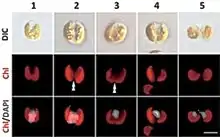Geminigeraceae
Geminigeraceae is a family of cryptophytes containing the five genera Geminigera, Guillardia, Hanusia, Proteomonas and Teleaulax.[1] They are characterised by chloroplasts containing Cr-phycoerythrin 545, and an inner periplast component (IPC) comprising "a sheet or a sheet and multiple plates if diplomorphic". The nucleomorphs are never in the pyrenoid, and there is never a scalariform furrow. The cells do, however, have a long, keeled rhizostyle with lamellae (wings).[1]
| Geminigeraceae | |
|---|---|
 | |
| Guillardia theta. DAPI-staining images showing the representative cells of cell cycle stages based on the localization of the nucleus and the shape of the chloroplast. DIC, images of differential interference contact; Chl, chloroplast autofluorescence; Chl/DAPI, merged images of Chl and DAPI. The double arrowhead indicates constriction of the chloroplast division site. Scale bar = 5 µm | |
| Scientific classification | |
| Kingdom: | Chromista |
| Phylum: | Cryptophyta |
| Class: | Cryptophyceae |
| Order: | Pyrenomonadales |
| Family: | Geminigeraceae B. L. Clay, P. Kugrens & R. E. Lee, 1999 |
| Genera | |
References
- Brec L. Clay, Paul Kurgens & Robert E. Lee (1999). "A revised classification of Cryptophyta". Botanical Journal of the Linnean Society. 131 (2): 131–151. doi:10.1111/j.1095-8339.1999.tb01845.x.
This article is issued from Wikipedia. The text is licensed under Creative Commons - Attribution - Sharealike. Additional terms may apply for the media files.